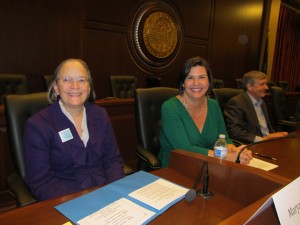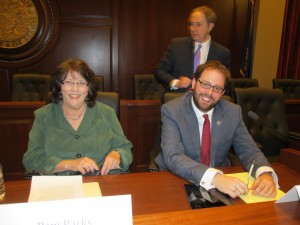
“Until all of us are free, none of us are free.”
That moving and thought-provoking statement by Rev. Marci Glass, pastor of Southminster Presbyterian Church in Boise, was one of many made during a February 6 panel discussion on the Idaho Human Rights Act held at the Idaho Statehouse in Boise and attended by more than 200, including legislators and the general public.
Glass was one of six participants on the panel, facilitated by Dr. David Adler, director of the Andrus Center for Public Policy, a Boise-based organization dedicated to independent, non-partisan policy formation on critical issues confronting Idaho and the rest of the country, including those related to civil liberties.
Pride Foundation was one of the co-sponsors of the discussion, organized by Add The Words Idaho and hosted by Idaho Sen. Cherie Buckner-Webb and Rep. Grant Burgoyne, who encouraged their fellow legislators to attend in the hope of encouraging them to learn more about the Idaho Human Rights Act and persuade them to amend the Act to include sexual orientation and gender identity among the list of those protected from discrimination. The state legislature has rejected such an amendment for the past six years.
The other members of the panel included Pam Parks, executive director of the Idaho Commission on Human Rights; Maryanne Jordan, president of the Boise City Council; Kevin Settles, an Idaho restaurateur; John Reuter, former president of the Sandpoint City Council; and Clark Krause, executive director for Boise Valley Economic Partnership.
“I never set out to be a campaigner on these issues, but here I am,” said Glass, noting that heterosexual people and married couples “take for granted” the many privileges they have, including something as basic as hospital visitations with their loved ones. “Our country’s founders talked about promoting the general welfare, which is a reminder of our better nature. We need to care for all of our neighbors. It’s what makes our nation great.”
Parks shared some history about the Idaho Human Rights Act, which was enacted in 1969 and has continued to be amended over the years. Including sexual orientation and gender identity is a natural extension, she said. “This legislative body was visionary 44 years ago. They need to be so again until everyone is protected.”
Reuter, who was instrumental in getting the north Idaho town of Sandpoint to become the first city in Idaho to pass a citywide non-discrimination ordinance with protections for sexual orientation and general identity/expression in December 2011, told a story of a city employee in her 60s who thanked him after the ordinance’s passage and revealed that she was a lesbian.
“She told me that it had transformed her life,” Reuter said. “She’d worried for so long about losing her job if people knew.” In rural communities, having protections for LGBTQ people is especially important, he said, because it’s more of a challenge for them to be publicly out due to a perceived lack of community support and fear of being fired or losing housing.
“When you take a realistic look at the image of Idaho in the rest of the country, it’s terrifying,” said Jordan, one of the Boise council’s primary proponents who helped the city pass its own LGBTQ non-discrimination ordinance in December 2012. “For those of us who are trying to build a better, more diverse and economically stable community, there are days where we feel like we take two steps forward and three steps back. The health and safety of our constituents is paramount. When we don’t provide protections, we create an unprotected class of people who don’t feel safe in their own communities.”
Amending the Idaho Human Rights Act “is about doing the right thing,” said Krause, who as part of his job helps recruit companies to do business in Idaho, fielding such questions from them as how a community embraces diversity, which he said is always a challenge. “These companies are reading your newspapers and if a headline gets out there indicating a problem in your community, you’re crossed off the list of being considered.”
Settles, who owns three Bardenay distillery pub restaurants in Idaho, echoed Krause’s sentiments. “We have to be inclusive of everyone,” he said. “If not, then you’re exclusive – and exclusive restaurants don’t survive.”
An ACLU of Idaho worksheet of talking points about what the Idaho Human Rights Act amendment would do and more reasons why it’s good for business can be found here.
The hour-long panel discussion was taped and will be recorded onto DVDs that will be distributed to organizations and individuals statewide who wish to organize parties and public gatherings to view the discussion, with a particular push to do so during the first week of March prior to an anticipated re-introduction of an Add the Words bill this year. To get a DVD copy, email Add The Words Idaho spokesperson Mistie Tolman at mistietolman@yahoo.com.
You can read more about the panel discussion in a Spokesman-Review story here and view a KBOI TV news story about it featuring an interview with me here.
Steve Martin is Pride Foundation’s Regional Development Organizer in Idaho. Email Steve.
